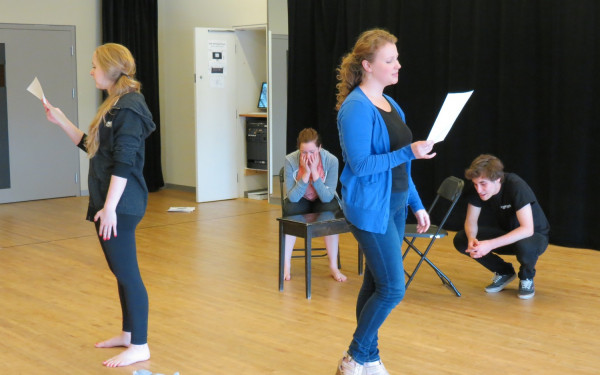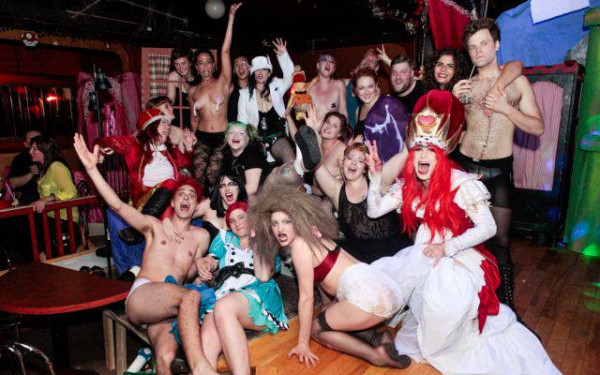Mainline Narrowly Escapes the Flatline
Longstanding Montreal Theatre Is Back—and Kicking
December was a scary month for Amy Blackmore.
After being involved with Mainline Theatre since its birth in the fall of 2005 and officially working there since 2008, the company was on its final legs. Bills were piling up and overhead was high. The income simply wasn’t enough.
“Being open for so many years means you end up owing a lot of money to a lot of different people,” said Blackmore. “It’s hard for young companies to afford to rent theatre space for a week.”
By mid-December, the slow season was hitting the theatre hard. So hard, in fact, that it looked like it would be the last slow season Mainline would ever endure. There was $15,000 separating Mainline from still being able to call itself the “Home for Indie Theatre on the Main” in 2013. It was facing bankruptcy.
“It was almost like feeling like you’re going to lose your house. There are a lot of people who have spent a lot of time there,” said Blackmore, recalling her mental state in mid-December.
“Work is work, right? If you work on something and it doesn’t work out in the end you can move on to something else—but the thing about Mainline, it’s more than that. It really is a home.”
And then, the community came to help.
Almost 300 donations later—ranging from $4.00 to $2,000—Mainline had $20,000 in the bank and was finally back on safe ground. At least, for the time being.
The donations went towards paying bills—saving Mainline from any kind of immediate danger. And, perhaps most importantly, able to be sure there would be a 2013 season.
After the fundraising campaign was done, Jeremy Hechtman, director of Mainline for 17 years, handed over the reins to Blackmore. She had worked as his longtime apprentice, as well as the director of Montreal’s Fringe Festival—coordinated out of Mainline.
“The thing about Jeremy is he’s the kind of guy who always has a trick up his sleeve,” said Blackmore, laughing. “So I don’t think this is the last of him.”
Now, in order to keep Mainline from re-entering a downwards financial spiral similar to that of late 2012, a few changes are planned—as Blackmore puts it, “A Sustainability Action Plan.”
But making money sometimes means changing the things that made the theatre unique to begin with.
For starters, they’re expanding.
“Were looking to have poetry readings and film screenings. I think it’s about opening it up a little more, kind of in the same vein as the Fringe Fest,” said Blackmore. “Fringe is multidisciplinary and I think a bit of that might transpose itself onto the theatre.”
“It encompasses all of the arts anyways. You have your performers, you have your writers, you have your visual artists, photographers—it sort of just makes sense. Even with change it’s still the same place. It’s still Mainline.”
—Amy Blackmore, Mainline Theatre Director
After opening eight years ago as a venue for the indie-anglo Montreal theatre community, the focus now is to plan ahead, even if no one is quite certain what the future is going to entail.
A sustainable plan means trying something new, even if that new venture is a well-known trick when it comes to theatre funding.
“We need to diversify the income costs, and it shouldn’t just be through space rentals—there are other ways for theatres to make some money,” she said.
What Blackmore is talking about is old news in theatre funding. Things like donor lists and seat plaques, sponsorship and annual fundraising—things the company never did before, but now won’t be able to do without. “I think that being an indie company, you sometimes forget that there are sort of traditional ways to bring in income,” she said.
“We still have this young crew that comes in, especially students, week after week—but we also have audience members that have grown up with the space, and they have more full-time jobs and they want to give back to it.”
Although modifications are going to have to be made to support the survival of the theatre, Blackmore prefers to refer to them as “natural progressions” rather than outright changes.
“That being said, I think the theatre’s primary focus will always be theatre,” she said. “But it encompasses all of the arts anyways. You have your performers, you have your writers, you have your visual artists, photographers—it sort of just makes sense. Even with change it’s still the same place. It’s still Mainline.”
Despite evolution that sways in the direction of the mainstream, it’s hard to imagine the theatre as a space that would ever sell out or go corporate.
“I think indie means that you can do it yourself. I think that the only time that having a new revenue stream is an issue is when it conflicts with your values as a company—then that is a problem.”
The $20,000 is essentially already accounted for. After the bills are paid, the donations are going to help the company carry themselves through January and February, until the Fringe Season starts in March and booking starts to pick up.
The new Sustainability Action Plan consisting of new revenue streams should kick in by the end of summer.
One of the issues that plagued Mainline, along with plenty of other theatres geared towards young artists, is that the people looking to rent the venue simply can’t afford to do so. The theatres, in turn, can’t offer their spaces at any lower cost because of overhead, and thus the vicious cycle of un-booked theatres begins.
Mainline has, hopefully, come up with somewhat of a solution, something Blackmore envisions as a “smaller, cheaper alternative” for productions on a tighter budget. The space, called The Mini-Main, used to be a rehearsal spot housed in the front of the full theatre.
“This time next year, I’d like the season to be completely packed. I’d like to see every week rented,” said Blackmore. “I’d love to see younger companies come out and do their own thing and come do it here, especially at Mini-Main.”
Ultimately, Blackmore says, the key to the theatre’s survival is that it won’t be one person running the show, but rather a community.
And without that same community, Mainline would have—as of two weeks ago—been another empty lot in the city where an art space used to be.

1_900_598_90.jpg)

3_600_375_90_s_c1.jpg)


